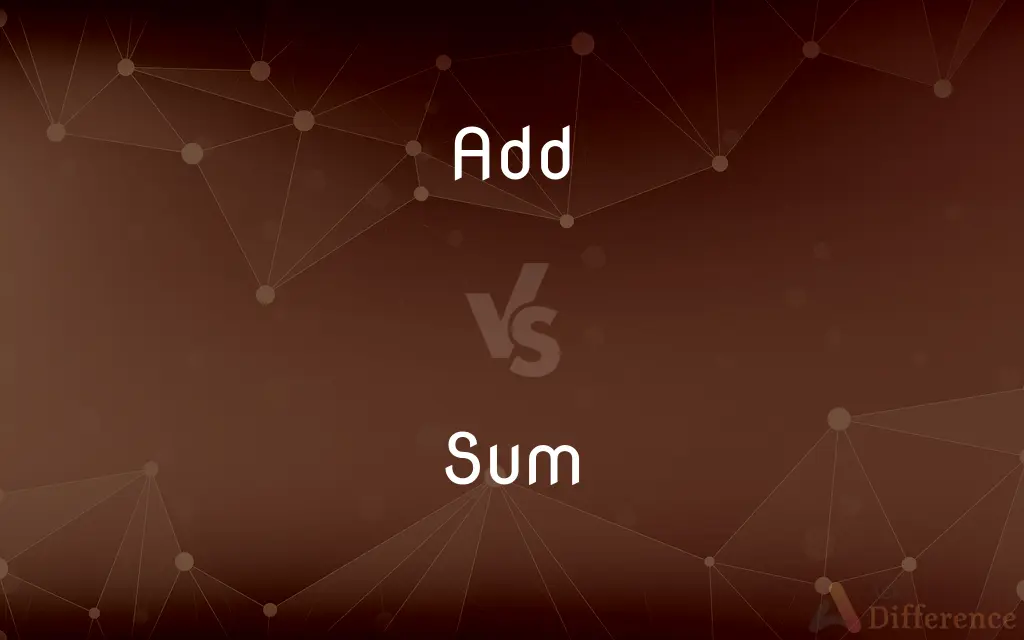Add vs. Sum — What's the Difference?
By Fiza Rafique & Maham Liaqat — Updated on May 6, 2024
Add refers to the action of combining two or more quantities, while sum is the total result of adding these quantities.

Difference Between Add and Sum
Table of Contents
ADVERTISEMENT
Key Differences
Adding involves the process of combining numbers or quantities to increase the total value, while sum denotes the final result of this combination process. In mathematics, to add means to put together figures, whereas sum refers to the answer obtained after the addition.
Add is a verb that describes the action of calculation, particularly the process of arithmetic addition. On the other hand, sum can function as both a noun, describing the result, and a verb, which means to calculate the total of various elements.
The term add is used in a variety of contexts beyond mathematics, such as adding ingredients in cooking or adding entries in a list. Conversely, sum is typically used in more quantitative contexts, emphasizing the totalizing aspect, like summing up expenses or the sum of all fears.
In programming, add is a common function in many languages, where it directly alters data values by increasing them. Sum, however, is often used to refer to a function that calculates the total of an array or list of numbers.
Educational contexts frequently teach the concept of add from an early age, focusing on the action of combining numbers. Sum, however, is introduced as a concept to represent the outcome of addition, crucial in developing a deeper understanding of arithmetic and algebra.
ADVERTISEMENT
Comparison Chart
Part of Speech
Verb
Noun, Verb
Usage
Process of adding
Result of adding
Context
General calculation
Quantitative totalization
Example in Math
Add 5 and 3
Sum of 5 and 3 is 8
Other Contexts
Add ingredients
Sum of expenses
Compare with Definitions
Add
To say something further.
She added that the project would be completed soon.
Sum
A particular amount of money.
He saved a large sum.
Add
In technology, to incorporate a new element or component.
Add a new user to the database.
Sum
In computing, a function that calculates total.
The function computes the sum of all values in the array.
Add
To join something to something else so as to increase the size, number, or amount.
Add the tomatoes to the sauce.
Sum
The total amount resulting from the addition of two or more numbers, amounts, or items.
The sum of 20 and 30 is 50.
Add
To put together two or more numbers or amounts to calculate their total value.
Add these figures to get the total.
Sum
The whole extent of something, total.
The sum of our experiences shapes our perspective.
Add
To include something extra.
Add a pinch of salt to the recipe.
Sum
The essence or gist of a text or speech.
The sum of his argument is that we must act now.
Add
Join (something) to something else so as to increase the size, number, or amount
A new wing was added to the building
Some box offices now add on a convenience charge
Sum
An amount obtained as a result of adding numbers.
Add
Put in (an additional element, ingredient, etc.)
Chlorine is added to the water to kill bacteria
Sum
An arithmetic problem
A child good at sums.
Add
Put together (two or more numbers or amounts) to calculate their total value
Add the two numbers together
They added all the figures up
Sum
The whole amount, quantity, or number; an aggregate
The sum of the team's combined experience.
Add
Say as a further remark
We would like to add our congratulations
‘I hope we haven't been too much trouble,’ she added politely
Sum
An amount of money
Paid an enormous sum.
Add
To join or combine (numbers) through addition
If you add 5 and 10 and 17, the result is 32. If you add 6 to 8, you get 14.
Sum
A summary
My view of the world, in sum.
Add
To join or unite so as to increase in size, quantity, quality, or scope
Added 12 inches to the deck.
Flowers that added beauty to the dinner table.
Sum
The central idea or point; the gist.
Add
To say or write further.
Sum
(Mathematics) To add.
Add
To find a sum in arithmetic.
Sum
To give a summary of; summarize.
Add
To constitute an addition
An exploit that will add to her reputation.
Sum
A quantity obtained by addition or aggregation.
The sum of 3 and 4 is 7.
Add
To create or make an addition
Gradually added to my meager savings.
Sum
(often plural) An arithmetic computation, especially one posed to a student as an exercise (not necessarily limited to addition).
We're learning about division, and the sums are tricky.
Add
(transitive) To join or unite (e.g. one thing to another, or as several particulars) so as to increase the number, augment the quantity, or enlarge the magnitude, or so as to form into one aggregate.
Sum
A quantity of money.
A tidy sum
The sum of forty pounds
Add
To sum up; to put together mentally; to add up.
To add numbers
Sum
A summary; the principal points or thoughts when viewed together; the amount; the substance; compendium.
This is the sum of all the evidence in the case.
This is the sum and substance of his objections.
Add
(transitive) To combine elements of (something) into one quantity.
To add a column of numbers
Sum
A central idea or point; gist.
Add
(transitive) To give by way of increased possession (to someone); to bestow (on).
Sum
The utmost degree.
Add
(transitive) To append (e.g. a statement); to say further information; to add on.
Sum
(obsolete) An old English measure of corn equal to the quarter.
Add
(intransitive) To make an addition; to augment; to increase; to add on.
It adds to our anxiety.
Sum
The basic unit of money in Kyrgyzstan.
Add
To perform the arithmetical operation of addition.
He adds rapidly.
Sum
The basic unit of money in Uzbekistan.
Add
To summon minions or reinforcements.
Typically, a hostile mob will add whenever it's within the aggro radius of a player.
Sum
A type of administrative district used in China, Mongolia, and Russia. In Mongolia, a sum is smaller than a province. In China, it is only used in Inner Mongolia, where it is equivalent to a township.
Add
(radio) The addition of a song to a station's playlist.
Sum
(transitive) To add together.
Add
(computer science) An act or instance of adding.
Sum
(transitive) To give a summary of.
Add
(video games) An additional enemy that joins a fight after the primary target.
When the player has fought the boss for one minute, two adds will arrive from the back and must be dealt with.
Sum
Eye dialect of some
Add
To give by way of increased possession (to any one); to bestow (on).
The Lord shall add to me another son.
Sum
Eye dialect of some
Add
To join or unite, as one thing to another, or as several particulars, so as to increase the number, augment the quantity, enlarge the magnitude, or so as to form into one aggregate. Hence: To sum up; to put together mentally; as, to add numbers; to add up a column.
Back to thy punishment,False fugitive, and to thy speed add wings.
As easily as he can add together the ideas of two days or two years.
Sum
The aggregate of two or more numbers, magnitudes, quantities, or particulars; the amount or whole of any number of individuals or particulars added together; as, the sum of 5 and 7 is 12.
Take ye the sum of all the congregation.
Add
To append, as a statement; to say further.
He added that he would willingly consent to the entire abolition of the tax.
Sum
A quantity of money or currency; any amount, indefinitely; as, a sum of money; a small sum, or a large sum.
With a great sum obtained I this freedom.
Add
To make an addition. To add to, to augment; to increase; as, it adds to our anxiety.
Sum
The principal points or thoughts when viewed together; the amount; the substance; compendium; as, this is the sum of all the evidence in the case; this is the sum and substance of his objections.
Add
To perform the arithmetical operation of addition; as, he adds rapidly.
Sum
Height; completion; utmost degree.
Thus have I told thee all my state, and broughtMy story to the sum of earthly bliss.
Add
A condition (mostly in boys) characterized by behavioral and learning disorders
Sum
A problem to be solved, or an example to be wrought out.
A sum in arithmetic wherein a flaw discovered at a particular point is ipso facto fatal to the whole.
A large sheet of paper . . . covered with long sums.
Add
Make an addition (to); join or combine or unite with others; increase the quality, quantity, zise or scope of;
We added two students to that dorm room
She added a personal note to her letter
Add insult to injury
Add some extra plates to the dinner table
Sum
To bring together into one whole; to collect into one amount; to cast up, as a column of figures; to ascertain the totality of; - usually with up.
The mind doth value every moment, and then the hour doth rather sum up the moments, than divide the day.
Add
State or say further;
`It doesn't matter,' he supplied
Sum
To bring or collect into a small compass; to comprise in a few words; to condense; - usually with up.
"Go to the ant, thou sluggard," in few words sums up the moral of this fable.
He sums their virtues in himself alone.
Add
Bestow a quality on;
Her presence lends a certain cachet to the company
The music added a lot to the play
She brings a special atmosphere to our meetings
This adds a light note to the program
Sum
To have (the feathers) full grown; to furnish with complete, or full-grown, plumage.
But feathered soon and fledgeThey summed their pens [wings].
Add
Make an addition by combining numbers;
Add 27 and 49, please!
Sum
A quantity of money;
He borrowed a large sum
The amount he had in cash was insufficient
Add
Determine the sum of;
Add all the people in this town to those of the neighboring town
Sum
A quantity obtained by addition
Add
Constitute an addition;
This paper will add to her reputation
Sum
The final aggregate;
The sum of all our troubles did not equal the misery they suffered
Sum
The choicest or most essential or most vital part of some idea or experience;
The gist of the prosecutor's argument
The heart and soul of the Republican Party
The nub of the story
Sum
The whole amount
Sum
The basic unit of money in Uzbekistan
Sum
A set containing all and only the members of two or more given sets;
Let C be the union of the sets A and B
Sum
Be a summary of;
The abstract summarizes the main ideas in the paper
Sum
Determine the sum of;
Add all the people in this town to those of the neighboring town
Common Curiosities
Is there a symbolic representation for 'add' in mathematics?
Yes, the plus sign (+) is the symbolic representation used to indicate addition in mathematics.
What does 'add up' mean in everyday language?
'Add up' can mean to make sense or seem reasonable in everyday language, as in a situation or explanation adding up.
What is the difference between 'total' and 'sum'?
'Total' and 'sum' both refer to the outcome of adding several numbers; however, 'total' is often used more broadly in various contexts, whereas 'sum' is more specific to the result of an arithmetic addition.
How is 'sum' used in statistics?
In statistics, 'sum' is used to describe the total obtained from adding all the numbers in a dataset, important for calculating averages and other statistical measures.
What is the main function of the verb 'add'?
The main function of the verb 'add' is to combine or join numbers, items, or amounts to increase the total.
Can 'sum' refer to a summary?
Yes, 'sum' can also refer to a summary or the gist of an argument or discussion.
What educational concepts are associated with 'sum'?
In education, 'sum' is associated with basic arithmetic and is often one of the first mathematical concepts taught to children, highlighting the result of addition.
Is it correct to use 'sum' when referring to combining non-numeric items?
Typically, 'sum' is used in the context of numeric items, although metaphorically it can be used for combining or summarizing non-numeric elements.
Are there any common idioms or expressions using 'sum'?
A common idiom using 'sum' is "the sum of all fears," which refers to the worst of all possible outcomes.
How do digital calculators utilize 'add' and 'sum'?
Digital calculators use 'add' to perform ongoing addition operations and may use a 'sum' function to quickly calculate the total of a series of inputs.
Can 'add' be used in a metaphorical sense?
Yes, 'add' can be used metaphorically to mean contributing or enhancing something, such as adding value or adding perspective.
What role does 'sum' play in programming languages?
In programming languages, 'sum' is often a built-in function used to calculate the total of elements within arrays or lists.
Is there a historical or etymological difference between 'add' and 'sum'?
Historically, 'add' comes from the Latin 'addere', which means 'to add or give to', while 'sum' derives from 'summa', the Latin word for 'main part or whole amount', indicating their original uses and meanings.
How do computer programs utilize the function 'add'?
Computer programs use the 'add' function to increment values, combine data points, or manage array elements by increasing their numerical values.
Does 'add' have synonyms in mathematical contexts?
In mathematical contexts, synonyms for 'add' include 'sum', 'total', 'combine', and 'increase'.
Share Your Discovery

Previous Comparison
Amoeba vs. Entamoeba
Next Comparison
Pathology vs. PathophysiologyAuthor Spotlight
Written by
Fiza RafiqueFiza Rafique is a skilled content writer at AskDifference.com, where she meticulously refines and enhances written pieces. Drawing from her vast editorial expertise, Fiza ensures clarity, accuracy, and precision in every article. Passionate about language, she continually seeks to elevate the quality of content for readers worldwide.
Co-written by
Maham Liaqat













































